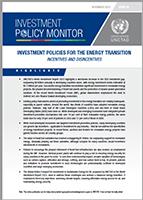
Investment Policy Monitor, Issue No 26
- UNCTAD's World Investment Report 2023 highlights a worrisome increase in the SDG investment gap, surpassing $4 trillion annually in developing countries alone, with energy investment needs estimated at $2.2 trillion per year. Successful energy transition necessitates significant investment in renewable energy projects, the phased decommissioning of fossil fuel assets and the promotion of cleaner power generation solutions. At the recent World Investment Forum (WIF), global stakeholders emphasized the need to redirect net-zero finance toward developing economies.
- Existing policy frameworks aimed at promoting investment in the energy transition are notably inadequate, especially in poorer nations. Around the world, two-thirds of countries have adopted renewable energy However, only half of the Least Developed Countries (LDCs) and one-third of Small Island Developing States (SIDS) have done so. While developed and emerging economies have integrated private investment promotion mechanisms into over 70 per cent of their renewable energy policies, the same holds true for only 24 per cent of policies in LDCs and 17 per cent of those in SIDS.
- While most developed economies use targeted investment promotion policies, many developing countries use generic tax incentives – applicable to investment in any industry – that do not address the specificities of energy investment projects. In recent times, auctions and tenders for renewable energy projects have gained traction across all country groups.
- The value of fossil fuel subsidies has reached a staggering $1 trillion, far surpassing support for renewable Gradually phasing out these subsidies, although complex for many countries, would incentivize investments in renewables.
- Policies to encourage the phased retirement of fossil fuel infrastructure are also needed, as emphasized during the WIF. However, thermal power plants will continue to play a role in ensuring energy security for many countries in the years to come. To curb their environmental impact, broader adoption of technologies such as carbon capture, utilization and storage, cofiring, and low-carbon fuels is key. At present, policies and initiatives to promote investment in such technologies are predominantly confined to developed countries and large emerging economies.
- The Global Action Compact for Investment in Sustainable Energy for All, proposed by UNCTAD in the World Investment Report 2023, aims to address these challenges and achieve a balanced energy transition. It emphasizes three key objectives: achieving climate targets, ensuring affordable energy access for all, and maintaining energy security.
Investment policies for the energy transition: Incentives and disincentives - Investment Policy Monitor, Issue No 26 (UNCTAD/DIAE/PCB/INF/2023/8)
21 Nov 2023


